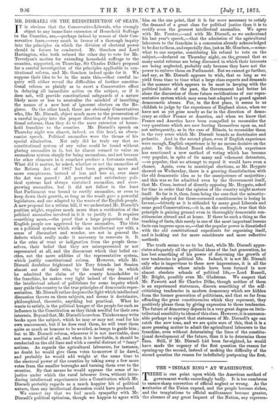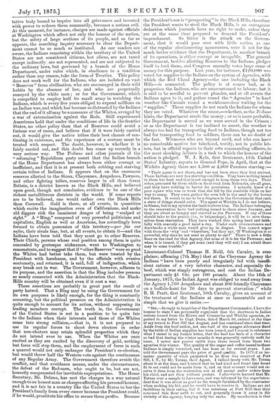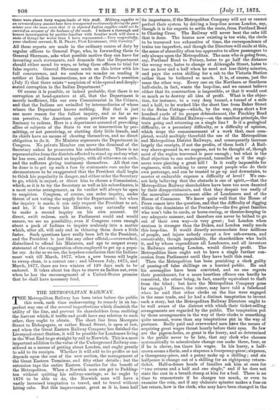THE "INDIAN RING" AT WASHINGTON.
THERE is one point upon which the American method of government works exceedingly badly. It is too cumbrous to ensure sharp correction of official neglect or wrong. As the berritories of the Union expand, and the people become richer, and the temptations to official malfeasance become greater, the absence of any great Inquest of the Nation, any represen-
tative body bound to inquire into all grievances and invested with power to redress them summarily, becomes a serious evil. At this moment, for instance, charges are made against officials at Washington which affect not only the honour of the nation, but the safety of large sections of its people, and so far as appears, the searching inquiry necessary to clear the Depart- ment cannot be so much as instituted. As our readers are aware, the Indians remaining within the territory of the United States are not considered citizens but aliens, are not taxed except indirectly, are not represented, and are not subjected to the ordinary laws, but governed by a branch of the Home Department, under rules which, in obedience to a tradition rather than any reason, take the form of Treaties. This policy does not work well for the Indians, who are isolated on vast " Reserves " from civilisation, who are encouraged in their wild habits by the absence of law, and who are perpetually anneyed by the white men ; or for the Government, which is compelled to employ half its small army in watching the Indians, which is every five years obliged to expend millions on an Indian war, and which has become so distrusted by the Indians that the end of it all may be a massacre of the Whites, avenged by a war of extermination against the Reds. Still experienced Americans hold that under the conditions of life in the frontier States, no other policy than that of Reserves could avoid a furious war of races, and believe that if it were fairly carried out, it would give the native tribes their best chance of con- tinuing in existence, and the experience of a century must be treated with respect. The doubt, however, is whether it is fairly carried out, and this doubt has come up recently in a very serious way. The Tribune and other journals of the " reforming " Republican party assert that the Indian branch of the Home Department has always been either corrupt or inefficient, and that it is at present both robbing and starving certain tribes of Indians. It appears that on the enormous reserves allotted to the Sioux, Cheyennes, Arapahoes, Pawnees, and other fighting tribes, reserves larger in all than Great Britain, is a district known as the Black Hills, and believed upon good, though not conclusive, evidence to be one of the richest metalliferous districts in the world. If some reports are to be believed, one would rather own the Black Hills than Cornwall. Gold is there, at all events, in quantities which excite the imagination even of Californians, and make old diggers risk the imminent danger of being "scalped at sight." A "Ring," composed of very powerful politicians and capitalists, English as well as American, has accordingly been formed to obtain possession of this territory—per fccs cut nefas, their rivals fear, but, at all events, to obtain it—and the Indians have been told that they must go to other Reserves. Their Chiefs, persons whose real position among them is quite concealed by grotesque nicknames, went to Washington to remonstrate, and to suggest that if "other Reserves "were so good the Whites had better take them, but were treated by the President with harshness, and by the officials with evasive contumely, and returned, it is said, full of indignation which may break out in war. The Government, however, adheres to its purpose, and the assertion is that the Ring includes persons so nearly connected with the Administration that the Black- Hills country will be obtained even if it cost a war.
These assertions are probably in great part the result of party hatred. That a Ring may be using the Government for its own purposes is likely enough, for the thing is constantly occurring, but the political pressure on the Administration is quite enough to account for its action, without supposing its leading members corrupt. The truth is, the Government of the United States is not in a position to be quite fair to the Indians when their interests and those of the Whites come into strong collision,—that is, it is not prepared to use its regular forces to shoot down electors in order that non-electors may retain splendid properties which they do not intend ever to use. When the Whites are once excited as they are excited by the discovery of gold, nothing but force will stop them, and the employment of force in such a quarrel would not only endanger the President's re-election, but would throw half the Western vote against the continuance of any Regular Army. The Government therefore avoids the conflict, and that avoidance means, under the circumstances, the defeat of the Red-men, who ought to be, but are not, honestly compensated for inevitable expropriations. The Home Secretary, Mr. Delano, has met the charges in a way natural enough to an honest man as charges affecting his personal honour, and it is not fair in a country like the United States to bar the President's family from every career because the President could, if he would, prostitute his office to secure them profits. Because the President's son is " prospecting " in the Black Hills, therefore the President wants to steal the Black Hills, is an outrageous deduction which journals have no right to make, unless they are at the same time prepared to demand the President's impeachment. So bitter is the attack on the Govern- ment, that it would pass over with little notice, as one of the regular electioneering manceuvres, were it not for the much better evidence that the Department, in another branch of its operations, is either corrupt or incapable. The general Government, besides allotting Reserves to the Indians, pledges itself to feed them, and Congress annually votes large sums of money for this purpose. Last year, for instance, £120,000 was voted for supplies to the Indians on the system of Agencies, with which the Red Cloud Agency—the one including the Black Hills—is connected. The policy is of course bad, as it pauperises the Indians, who are unaccustomed to labour; but it is said to be needful to prevent plunder, and at all events the Indians agree to it, and gather round the " Agencies " in hard weather like Casuals round a workhouse-door waiting for the "supplies." These supplies do not reach the Indians for whom they are voted. Whatever the cause,—whether, as the Tribune hints, the Department steals the money ; or as is more probable, the Department is served as we were served in the Crimea ; or as the Department is too inclined to assert, the weather is always too bad for transporting food to Indians, though not too bad for transporting food to soldiers, there can be no doubt of the fact. Witnesses who are beyond cavil, and who can have no conceivable motive for falsehood, testify, not in public let- ters, but in official reports to their oul'n commanding officers, to the most shocking failures in a task to which the honour of the nation is pledged. W. J. Kyle, first lieutenant, 11th United States' Infantry, reports to General Pope, in April, that at the Wichita Agency there are 1,500 or 2,000 Pawnees starving :—
" Their agent is not there, and has not been since they first arrived. These Indians are now in a starving condition. They have nothing issued to them but beef, and that is not enough to keep them two days. Their robes, procured by them while on their road from Nebraska, are all gene, and they have nothing to barter for provisions. I actually knew of a poor squaw who was so weak that she fell by the roadside while on her way to camp. They even gather the corn left in the sand by the horses fed there. It seems to me to be a disgrace to the Government that such a state of things should exist. The agent at Wichita is, I do not believe, to blame, but in my opinion the fault is above him. The Indians belonging to the reservation have had nothing issued to them since January, and they are about as hungry and starved as the Pawnees. If any of these should take to the prairie (i.e., to brigandage), it will be to save them- selves from starvation. They have worked this spring hard and faith- fully with scarcely a good meal a day. Under such circumstances and drawbacks a white man would give up in disgust. You cannot argue with them the 'why' and 'wherefore,' but they say, 'If Washington is so powerful, why does he not send us plenty to eat?' There is now a little flour on the road for that Agency, but none of it is for the Pawnees; and when it is issued, if they get none (and they will not) I am afraid ihere may be some trouble."
Lieutenant-Colonel Thomas II. Neill, 6th Cavalry, is even plainer, affirming (7th May) that at the Cheyenne Agency the Indians "have been poorly and irregularly fed with insuffi- cient rations of a very inferior character, and especially the beef, which was simply outrageous, and cost the Indian De- partment only $1 64c. per 100 pottuas About the 16th. of January, 1875, the Indian Agent was obliged to send away from the Agency 1,760 Arapahoes and about 200 friendly Cheyennes on a buffalo-hunt for 70 days to prevent starvation ;" while R. H. Pratt, first lieutenant, 10th Cavalry, gives an account of the treatment of the Indians at once so lamentable and so simple that we give it entire :—
" Sm,—In reply to inquiries of the Department Commander, I have the honour to state I am personally cognizant that the shortness in Indian rations issued from the Kiowa and Comanche and Wishita agencies, re- ported in my letter to Capt. Dunn, dated March 30, existed at the time ef my return to Fort Sill last August, and has continued since that time. Aside from the beef ration not one-half of the meagre allowance axed by the table of Indian supplies has been issued, and I repeat in substenae what I stated in my former letter, that the beet has been of a character so bad that during the winter months it was generally entirely unfit for issue. I never saw poorer cattle than those issued from these two agencies this winter. The quality of the sugar and coffee issued to these Indians is simply wretched, and has been so for several years. I am told the Government pays the price of good quality. In 1871-2 an im- mense quantity of what purported to be flour was received at Fort Sill, I. T., by Mr. Tatum, their Agent. I talked freely with Mr. Tatum about it at the time, and learned that he had tried and found tbat bread fit to eat could not be made from it, and on that account would not re- ceive it then from the oontractor, nor at all except under orders *gm his chief, and not then without protest. I afterwards learned that *. Tatum sent a sample to Lawrence, and was informed by the superinten- dent that it was about as good as the sample furnished by the contractor when making his bid, and he would have to receive it. Indians are ppt fastidious in their eating, but it was notorious at Fort Still that atey esteemed this flour mrfit to eat, and generally threw it away in the vicinity of the agency, keeping only the sacks. My recollection is that
there were about forty wagon-loads of this stuff. Military supplies to an extraordinary amount have been transported continuously during the past winter over the same route that it is objected Indian supplies could not be carried on account of the badness of the roads. I believe a thorough and honest investigation by parties familiar with frontier work will show a state of things far worse than I have represented.—Very respectfully, your obedient servant, R. H. Pular, First Lieutenant, 10th Cavalry."
All these reports are made in the ordinary course of duty by regular officers to General Pope, who, in forwarding them to General Sherman, asks what possible motive they can have for inventing such statements, and demands that the Department should either mend its ways, or bring these officers to trial for false reports. General Sherman sends on this letter with his full concurrence, and we confess we wonder on reading it neither at Indian insurrections, nor at the Tribune's assertion (July 3) that there exists "suspicion of wide-spread and deeply- seated corruption in the Indian Department."
Of course it is possible, or indeed probable, that there is no corruption at head-quarters at all, that the Department is merely inefficient, like our own Commissariat in the Crimea, and that the Indians are swindled by intermediaries of whose crimes the Department knows nothing. But that is just one more reason for the fullest inquiry, and as far as we can perceive, the American system provides no such pre- liminary to redress. Here is a department accused of provoking allies or subjects of the State to war or insurrection by per- mitting, or not perceiving, or abetting dirty little frauds, and its chiefs have no means of clearing themselves, and no direct obligation to do it. No Minister represents the Department in Congress. No private Member can move the dismissal of the Secretary unless he prosecutes his subordinates. There is no representative from the districts affected to stand up and say what he has seen, and demand an inquiry, with all witnesses on oath, and the sufferers giving testimony themselves. All that can be done is to get up such a fuss by statements sure under the circumstances to be exaggerated that the President shall begin to think his popularity in danger, and either order the Secretary to go, which is.unjust, or direct him to choose a Commission, which, as it is to try the Secretary as well as his subordinates, is a most unwise arrangement, as its verdict will always be open to suspicion. Congress, of course, can order inquiry, under threat of not voting the supply for the Department; but when the inquiry is made, it can only request the President to act, and he, if he trusts his Minister, may naturally want to make a second inquiry on his own account. Of direct, swift redress, such as Parliament could and would ensure, we see no possibility, even if Congress cares enough about a pack of Indians to inquire zealously into a matter which, after all, will only end in thinning them down a little faster. Such questions have really been left to the President, and the President is just like any other official,—overworked, disinclined to offend his Ministers, and apt to suspect every statement of the exaggeration often employed to get up a popu- lar cry. As far as we see, the hopeless conclusion that the Indians must wait till March, 1877, when anew broom will begin to sweep clean, is a correct one ; and between July, 1875, and March, 1877, there are two winters of 120 days each to be endured. It takes about ten days to starve an Indian out, even when he has the encouragement of a United-States promise that he shall have necessary food.




































 Previous page
Previous page